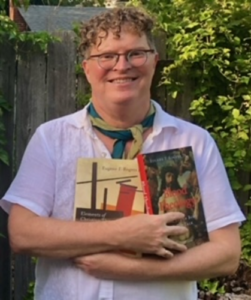Oliver Max Gardner Award
2022 UNCG NOMINEE – DR. EUGENE ROGERS

Dr. Eugene Rogers, Professor of Religious Studies and a faculty member in women’s, gender, and sexuality studies program, is UNC Greensboro’s O. Max Gardner Award nominee for 2022. It is the highest faculty honor awarded by the UNC Board of Governors, given annually since 1949. The award was established by Gardner’s wish to recognize faculty who have “made the greatest contributions to the welfare of the human race.” Award winners and nominees have made notable contributions of national or international scale.
Dr. Rogers has contributed to human welfare not only through his teaching, but also by publishing two new books in 2021, one for scholars and one for students. “Blood Theology: Seeing Red in Body and God-Talk” analyzes the language and symbolism of blood and how it is used in social situations, primarily from a Christian perspective. It has been nominated by Cambridge University Press for the award in “Constructive/Reflective Studies” of the American Academy of Religion (the annual academic convention in Religious Studies). It was the subject of a faculty-grad student workshop at the University of Virginia and, internationally, the common reading of the faculty-grad student Theology and Ethics Research Seminar at Durham University in the UK.
The second book, “Elements of Christian Thought: A Basic Course in Christianese” was originally written as a course for online lectures during the COVID-19 pandemic. It has sold over 500 copies and has been inquired about for translation rights. Both of these books provide a deeper understanding of religion and culture.
Dr. Rogers joined UNCG in 2005. His books have been reviewed all over the English-speaking world and translated into Swedish, German, and French. In 2008-2011, the U.S. Episcopal House of Bishops invited him to serve on a panel evaluating the theology of same-sex marriage. In 2013-2014, he served on the Board of Electors for the Regius Professorship of Divinity at Cambridge, the most prestigious academic theological position in the English-speaking world.
Rev. Dr. Aminah Al-Attas Bradford, Th.D., a post-doctoral research scholar at North Carolina State University, says of her former advisor, “Over six years of countless conversations in the classroom and at Rogers’ kitchen table, I have been formed firsthand by the commitments which have come to characterize Rogers’ vast contribution to human welfare writ large: how to transcend stifling boundaries (between religion and science, sacred and secular, the personal and the social), how to cultivate rigorous and respectful dialogue amidst profound disagreement, and how to practice an ethic of hospitality – both personal and intellectual – particularly with respect to sensitive matters of identity, diversity, and inclusion. At present, the uncertainty facing young humanities scholars like me is immense; Rogers’ mentorship has been indispensable, singular, transformative.”
Elizabeth A. Hardin, a 2022 Fellow at the Advanced Leadership Initiative at Harvard University and previous executive in residence at UNCG, says, “At every turn, Dr. Rogers emphasized his desire for his students to learn well. In his choice and provision of original and historic materials, in his emphasis on getting things right rather than meeting deadlines (within reason), in his use of writing as a means of learning – in choice after choice, it was clear that Dr. Rogers wanted every student to learn. In class, Dr. Rogers integrated what he said with what he wrote in frameworks that supported learning. The questions he asked and the issues he probed contributed to deep understanding.”
Story by Dana Broadus, University Communications
Photography credit, Dean John Kiss